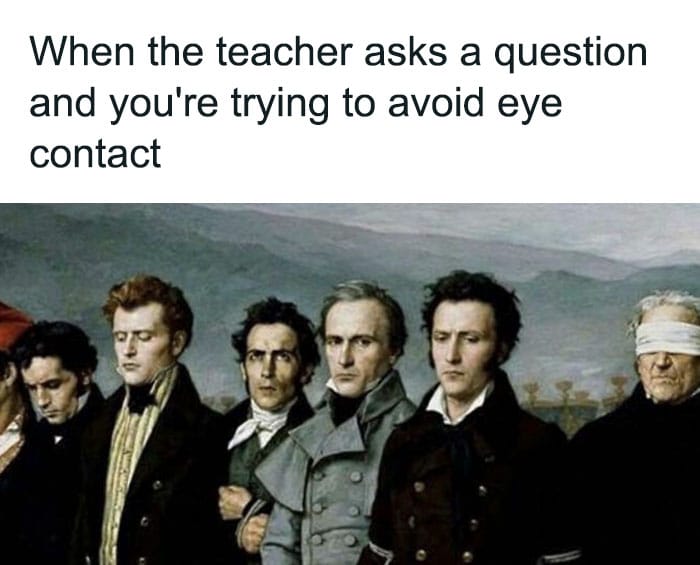Thursday
The other day I came across an amusing website that featured classical paintings that are being used as comic memes. My favorite, above, makes use of Antonio Gisbert Pérez’s painting The Execution of Torrijos and his Companions on the Beach at Málaga (1888), about the death of the Spanish revolutionary by the forces of Ferdinand VII in 1831.
My favorite literary example of embarrassing silences occurs in Sir Gawain and the Green Knight. More on that in a moment.
As a student, I found classroom silences excruciating and would sometimes just blurt something out to break them up. I remember twice being called out for that, the second time by someone who would go on to become famous. Future Minnesota senator and legendary progressive Paul Wellstone, whose Introduction to Government class I took at Carleton College in 1970, once shouted at me, “Will you please just shut up!” when I gabbed on. (The other professor, who had shouted, “Bullshit!”, later explained to me that he was taking out his frustrations at the class on me, given that I was one of the higher performing students. So maybe Wellstone was feeling similarly frustrated.) In any event, classroom silences can seem like highly charged affairs.
Once, in a teaching workshop, the faculty participants were asked how long a silence the average teacher will tolerate before he or she jumps in with an answer. We guessed five or ten seconds but thought perhaps longer. The actual answer: between .7 and 1.5 seconds.
In other words, everyone finds agonizing those moments that often follow a teacher’s question. Which brings me to the 14th century romance. In Sir Gawain and the Green Knight, an imposing giant “hurtles” into Camelot and, appearing to overlook the man sitting in the throne, asks, “Where is the captain of this crowd.” His disrespect for Arthur could not be made more plain:
This horseman hurtles in, and the hall enters;
Riding to the high dais, reeked he no danger;
Not a greeting he gave as the guests he o’erlooked,
Nor wasted his words, but “Where is,” he said,
“The captain of this crowd? Keenly I wish
To see that sire with sight, and to himself say
my say.”
He swaggered all about
To scan the host so gay;
He halted, as if in doubt
Who in that hall held sway.
If they were up to the challenge, all the knights would be up on their feet shouting to avenge the insult. Instead, behaving like Uvalde policemen called to a school shooting, “stone-still they sat in a swooning silence”:
There were stares on all sides as the stranger spoke,
For much did they marvel what it might mean
That a horseman and a horse should have such a hue,
Grow green as the grass, and greener, it seemed,
Than green fused on gold more glorious by far.
All the onlookers eyed him, and edged nearer,
And awaited in wonder what he would do,
For many sights had they seen, but such a one never,
So that phantom and faerie the folk there deemed it,
Therefore chary of answer was many a champion bold,
And stunned at his strong words stone-still they sat
In a swooning silence in the stately hall.
As all were slipped into sleep, so slackened their speech
apace.
In the so-called “bob and wheel” that ends the stanza, the poet’s sarcasm is exquisite. Surely, it’s not dread that accounts for their silence. No, it’s got to be a matter of courtesy that they are handing all responsibility over to Arthur:
Not all, I think, for dread,
But some of courteous grace
Let him who was their head
Be spokesman in that place.
In other words, the knights are all thinking, “I’m sure glad someone else is in charge here.”
Nor does it get any better when the Green Giant informs Camelot that he’s there to challenge them to a beheading game: first a knight will cut off his head, after which he will return the blow. The silence which follows probably lasts longer than 1.5 seconds:
If he astonished them at first, stiller were then
All that household in hall, the high and the low…
This allows the Green Knight to pile up the insults:
“What, is this Arthur’s house,” said that horseman then,
“Whose fame is so fair in far realms and wide?
Where is now your arrogance and your awesome deeds,
Your valor and your victories and your vaunting words?
Now are the revel and renown of the Round Table
Overwhelmed with a word of one man’s speech,
For all cower and quake, and no cut felt!”
With this he laughs so loud that the lord grieved;
The blood for sheer shame shot to his face, and pride.
With none of his men willing to stand up for him, Arthur steps forward to take the axe—at which point Gawain saves Camelot’s honor by himself volunteering.
Speaking up in class shouldn’t be as hard as volunteering to take an axe blow (or facing a firing squad), but it may sometimes feel that way. A good teacher, however, will find ways to put the silence to good use. Sometimes excellent discussions are birthed by a pregnant pause.
Or in Camelot’s case, the knights will learn a little humility.


